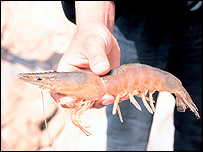|
Prawn trawlers catch 10-20 kg of marine species to
obtain just 1 kg of prawns in the tropics. This non-target
'bycatch' is usually discarded, dead or dying, overboard.
Prawn fisheries alone are responsible for one third of the world's discarded catch, despite producing less than 2% of global seafood.
Local fish stocks and fishing grounds are heavily impacted, and catches have declined sharply in areas where trawlers operate.
150,000 sea turtles are killed by prawn trawlers every year. Prawn trawling is also thought to be the greatest threat to seahorses.
Research has shown that up to 25% of seabed life can be removed by the pass of just one prawn trawl.
The Environmental Justice Foundation is calling for all supermarkets to prove their prawns come from environmentally and socially sustainable sources, urging consumers not to buy any prawns until this is done.
'Currently 70% of the world's fisheries are fully or overexploited and leading scientists agree that it is fishing - rather than global warming or pollution - that poses the greatest near-term threat to marine biodiversity', says Steve Trent, Director of EJF. Recent reports of overfishing and declines in fish stocks have begun to shatter the illusion that the seas are a limitless, inexhaustible resource. Yet few people are currently aware that prawn trawling is one of the most destructive and wasteful fisheries of all. '
This waste, to feed a luxury market here in the UK and other developed nations, is totally unacceptable when so many in poorer countries are going hungry. Just how much is the rest of the world paying for our prawn sandwiches?' says Trent.
Trawling is a 'catch-all' technique. Trawlers capture approximately three million tonnes of prawns every year from countries as diverse as Greenland, Venezuela and Mozambique. Vessels not only catch high-value prawns, but also hundreds of other 'bycatch' species that are usually discarded back into the sea. It is not uncommon to find that 10, or even 20 kg, of marine organisms are caught in order to obtain 1 kg of prawns.
For species such as sea turtles and seahorses, prawn trawling represents the greatest threat to their survival. A staggering 150,000 sea turtles are killed in prawn trawlers every year. Trawl nets dragged along the seabed profoundly degrade marine habitats. This degradation of the ocean floor has been compared by scientists to the destruction of the world's forests.
Local fish stocks and fishing grounds are also affected and catches have declined sharply in areas where trawlers operate. Prawn trawlers are not always locally owned.
Hundreds of foreign vessels exploit prawn stocks of developing countries, illegally or through fisheries agreements, discarding 'unwanted' fish that could have fed coastal communities. 'For the 450 million people reliant on fisheries as a source of food and income, fish is a necessity.
Prawn fisheries are directly compromising food security as well as furthering the demise of endangered marine species' said Annabelle Aish of EJF. In many cases these foreign trawlers are heavily subsidised: some EU fleets are underwritten by almost 50% to trawl for prawns in African waters.
The UN Environment Programme, Global Environment Facility and UN Food and Agricultural Organisation have all stated that many prawn fisheries are presently unsustainable and advocate changes to current patterns of exploitation.
'Harmful fishing subsidies and exploitative fisheries agreements with developing nations completely undermine the sustainable use of the oceans and need to be addressed immediately' said Aish. EJF calls for the greater implementation of existing international treaties on responsible fisheries management. EJF also calls for an independent, internationally-recognised system of certification and monitoring for prawn production.
Top
|
